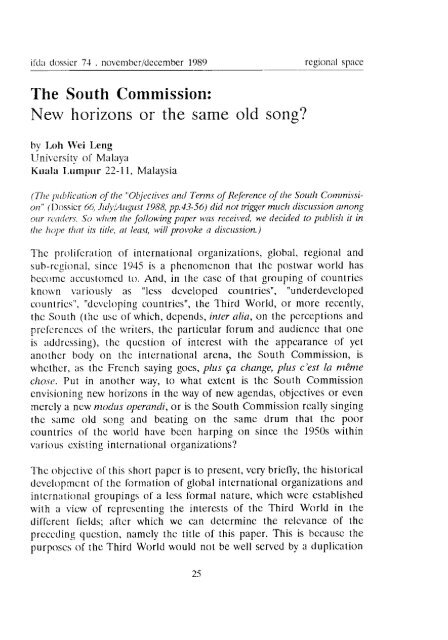ifda dossier 74 - Dag Hammarskjöld Foundation
ifda dossier 74 - Dag Hammarskjöld Foundation
ifda dossier 74 - Dag Hammarskjöld Foundation
You also want an ePaper? Increase the reach of your titles
YUMPU automatically turns print PDFs into web optimized ePapers that Google loves.
ifd;i <strong>dossier</strong> <strong>74</strong> . noven~bcr/december 1989 regional space<br />
The South Commission:<br />
New horizons or the same old song?<br />
by Loh Wei Leng<br />
University of Malaya<br />
Kuala Lumpur 22-11, Malaysia<br />
(The publication of die "Objectives and Terms of Reference of the South Cotntnission"<br />
(Dossier 66, J ~~~/'AII~I.Y~ 1988, pp.43-56) did not trigger much discussion among<br />
our readers. So when the following paper was received, we decided to publish it in<br />
tile Iwpe that its title, at least, will provoke a discussion.)<br />
The proliferation of international organizations, global, regional and<br />
sub-regional, since 1945 is a phenomenon that the postwar world has<br />
become accustomed to. And, in the case of that grouping of countries<br />
known variously as "less developed countries", "underdeveloped<br />
countries", "developing countries", the Third World, or more recently,<br />
the South (the use of which, depends, inter alia, on the perceptions and<br />
preferences of the writers, the particular forum and audience that one<br />
is addressing), the question of interest with the appearance of yet<br />
another body on the international arena, the South Commission, is<br />
whether, :is the French saying goes, plus $a change, plus c'est la m$me<br />
chose. Put in another way, to what extent is the South Commission<br />
envisioning new horizons in the way of new agendas, objectives or even<br />
merely a new modus operandi, or is the South Commission really singing<br />
the same old song and beating on the same drum that the poor<br />
countries of the world have been harping on since the 1950s within<br />
various existing international organizations?<br />
The objective of this short paper is to present, very briefly, the historical<br />
development of the formation of global international organizations and<br />
international eroupings of a less formal nature, which were established<br />
with a view of representing the interests of the Third World in the<br />
different fields; after which we can determine the relevance of the<br />
preceding question, namely the title of this paper. This is because the<br />
purposes of the Third World would not be well served by a duplication
















